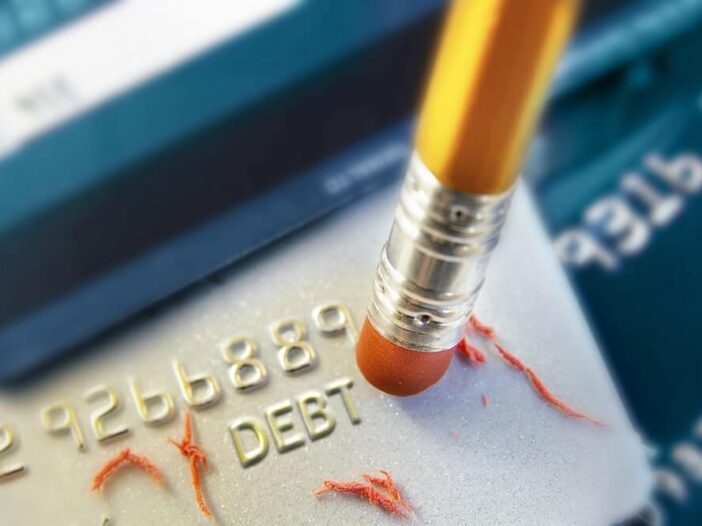Today I was going to talk about what will save Victoria.
From my 5km bubble, I was going to throw out the idea that perhaps Victorians — with the blessing of our lunatic government — may be able to dig our way out of trouble over the next decade.
That perhaps this tiny, hipster-driven, latte-sipping, COVID-ridden state, may become some sort of mining haven over the 2020s.
At least, these were my thoughts as the dog and I strolled down the road for our government approved exercise, to buy a giant latte in typical Melbourne spring rain.
Masked up — but still allowed to touch the communal paper — the front page of The Australian changed my morning topic with the headline: ‘Unshackled banks told — go for loans’.
A decade of financial changes is in the bin.
And the banks and the government are going to do whatever it takes to get you into some debt…sorry, I mean to get you to borrow.
All debt is good debt says government
Aussie citizens…let’s get ready to boooorrrrrooow.
The consumer credit protection laws passed in 2009 have been scrapped. All 100 pages of regulation ‘torn up’, says The Australian.
And I have no doubt that anything surrounding the dodgy banking practices revealed in the Banking Royal Commission will quietly be ignored.
Who needs facts and rules around predatory behaviour where there is an economy to stimulate?
From here on it’s all about ‘unlocking’ credit from the banks and getting it into the economy.
Former Prime Minister Kevin Rudd introduced a whole bunch of laws around private lending in the aftermath of the financial crisis. The consumer credit laws put the onus back on banks to verify the information. It morphed from borrower beware to banks are responsible for the information the individual provides.
The banks didn’t like it.
They don’t grow if they aren’t lending. It’s time-consuming…fact-checking individuals. They much preferred using their automated household cost methods that just assumed all households have similar costs.
Today’s announcement from federal Treasurer Josh Frydenberg essentially overturns Kenneth Haynes’ findings in the Banking Royal commission.
We could argue the banks have won their battle. They complained these restrictions stifled their role in the economy as lending machines. Banks simply couldn’t spit out enough loans to grow under the old rules.
Frydenberg has framed this deregulation favours small business. Arguing that banks are more likely to lend to small firms which will help grow the economy in the long run.
And I have no doubt that our crumbling economy which relies on the continuous expansion of credit to ‘grow’ is behind the push.
The question is, just how much debt are people expected to take on, and where will all this money go?
Houses won’t go higher if people don’t borrow more zeros from a bank
Australia is famous for exporting rocks, tasty animals, and — as I pointed out yesterday — our spectacular property bubble.
Property and commodities have been a disproportionate driver of Australia’s economic growth for three decades.
But here we are smack bang in the middle of an economic recession, and the economic selfishly won’t restart itself.
So, the government enters stage right with its dream of getting those lending machines to send out digital zeros into the economy.
The banks have said they can’t lend because the laws are like a noose around their necks. And I wonder just how many Aussies have the ability to take on more debt.
Given that a crucial part of Frydenberg’s deregulation is about lowering the loan-to-value ratio for houses — odds are this move will only lead to more money going towards housing.
Frydenberg has said that credit underpins home ownership and business investment. That’s true.
The problem is Australia’s credit is unlikely to go towards business investment the way the government wants.
The incredibly high cost of living in Australia is potentially stifling innovators. People would much rather whack a chunk of money onto a mortgage than put money into an idea that may never take off.
Those of us with the luxury of secure employment during the pandemic, overwhelmingly have put more money into savings or towards paying off debt. They’re not stimulating the economy. They’re protecting themselves.
The laziest thing a writer can do is to quote themselves. But here’s something — rather ironically I wrote on exactly the same date this time last year — that’s looking rather prophetic.
‘The point is, the old lending ways are back.
‘Nothing was learned from the past year.
‘We are about to witness a new credit boom in house prices.
‘You reckon the house price gains of the past decade were big? Well, you ain’t seen nothing yet.’
Even pre-pandemic moves were being made to make it easier to lend. The urgency of getting those loans into the economy has only increased. Where will all this new moolah end up?
Cheers,
 |
Shae Russell,
Editor, The Daily Reckoning Australia
Shae is also the editor of Rock Stock Insider and Hard Money Trader. By interviewing experts around the world, Shae’s Rock Stock Insider aims to show people why gold is sound money. Hard Money Trader is a speculative newsletter that recommends some of the riskiest stocks on the market…tiny gold explorers.

